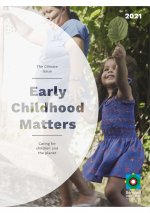
Early Childhood Matters 2021 - The Climate Issue - Caring for children and the planet
Omschrijving
Early Childhood Matters aims to elevate key issues, spread awareness of promising solutions to support holistic child development and explore the elements needed to take those solutions to scale. It is published annually by the Bernard van Leer Foundation. The views expressed in Early Childhood Matters are those of the authors and do not necessarily reflect those of the Bernard van Leer Foundation. Initiatives featured are not necessarily funded by the Bernard van Leer Foundation.
Making the climate conversation about children
Climate change is especially dangerous for children under 5. They have the overwhelming share of climate-related diseases, and are highly vulnerable to air pollution and heat.
When extreme weather forces young children to migrate, they face malnutrition, interrupted education and many other threats, during a key period in their physical and emotional growth. It’s also very reasonable to expect that a baby born today will grow up to experience major climate chaos and environmental degradation – worse than any faced by current adults. Despite all this, discussions about climate change seldom refer to the fate of young children. They should.
This year’s issue of Early Childhood Matters is dedicated to examining the many ways that climate change and early childhood intersect. We hear from leading policymakers, researchers, educators, urban planners and activists around the world about how to both develop ecological resilience, and improve wellbeing in the early years.
We also spotlight a critical fact: many of the measures that improve life for young children and their caregivers also help cities to cope with climate change.
In the first section, Evidence, we review the worrying data, to create greater awareness. The first five years of a child’s life are a crucial developmental period that is directly impacted by their environment. To better understand this, physicians Bruce Bekkar and Nathaniel DeNicola survey the American data and show that heat and air pollution are already threatening newborns (pages 34–38).
UNICEF’s Kelly Ann Naylor explains how droughts, floods and rising sea levels are making safe drinking water even more scarce, imperilling children’s health, education and very survival (pages 14–17).
Few people have looked at how climate change impacts new mothers and infants in indigenous communities. So Naomi Lanoi Leleto and Eva Rehse of the Global Greengrants Fund take us to a Kenyan village where nursing mothers and their newborns are suffering from its effects (pages 45–47).
Extreme weather events have forced millions of babies and toddlers to leave their homes and ecosystems. Researcher Lucy Earle, a specialist in forced displacement, shows that many end up in high-risk urban slums, where they face new climate challenges (pages 28–30).
